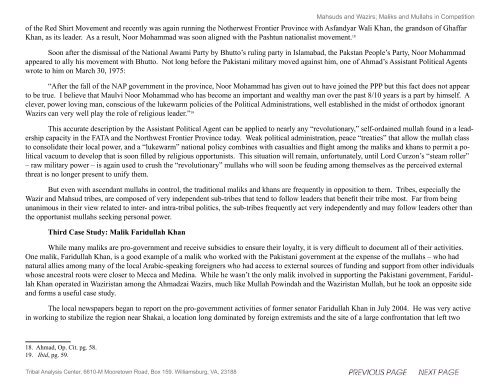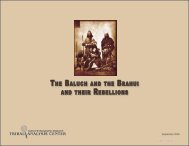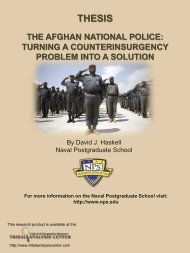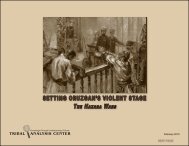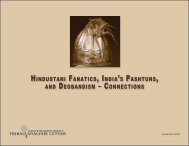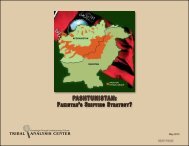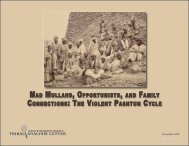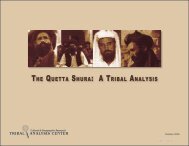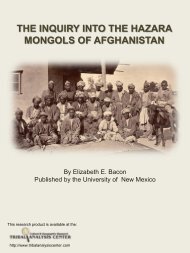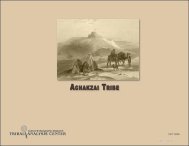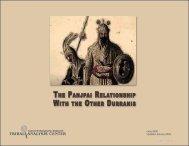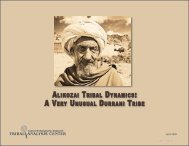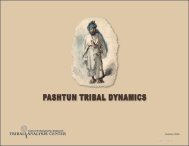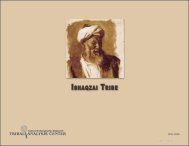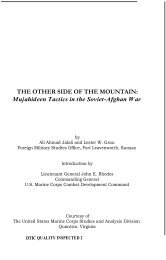<strong>Mahsuds</strong> <strong>and</strong> <strong>Wazirs</strong>; Maliks <strong>and</strong> Mullahs in CompetitionLower status tribes <strong>and</strong> sub-tribes are frequently the source of the problems experienced in the FATA, the Northwest Frontier Province, <strong>and</strong>even inside Afghanistan, as poorer tribes seek resources <strong>and</strong> status denied them by the more powerful, higher status tribes. In these situations, bothmullahs <strong>and</strong> maliks cooperate in leading their people into violent situations. In many ways, the government’s response to this general tendencytoward violence has worsened the violence. Government allowances to maliks are intended to ensure that the people led by the malik remain ongood behavior. These payments are calculated on a monthly basis, but are paid annually. Much like the mullahs who cannot attract supportersduring peaceful times, the maliks have good reason to ensure that trouble develops periodically – or their subsidies gradually erode. Kidnappingof officials, holding them for ransom or concessions, erection of roadblocks for the extortion of travelers, <strong>and</strong> the occasional sniping incident orbomb is part of a highly developed method of “tribal raiding.” Ahmad wrote, “To create a problem, control it, <strong>and</strong> terminate it is an acknowledged<strong>and</strong> highly regarded yardstick of political skill.” This tendency goes far beyond western Pakistan <strong>and</strong> has also been developed into an art form indistant Yemen where tourists are often kidnapped to force government concessions <strong>and</strong> road construction. This “raiding tendency” of the smaller,poorest tribes combined with jealousy of their more wealthy cousins are among the factors that allow creative, ambitious men to “self-ordain” <strong>and</strong>as mullahs, to lead their relatively naïve followers into jihad-like aggressive activity. Noor Mohammad, the “Waziristan mullah”, followed this precisepattern, but he focused his followers on the Mahsud tribe rather than the typical “foreign infidels.” Some form of “external threat” is essentialfor mullahs as they attempt to mobilize their followers. Atypically, Noor Mohammad chose his enemies poorly <strong>and</strong> his “proto-Taliban” movementfailed.Akbar Ahmad is correct with his view of the Waziristan Mullah’s revolt as “proto-Taliban-like,” but the context of the period is importantin underst<strong>and</strong>ing Noor Mohammad’s successful approach to creating a revolutionary change within the Wazir tribe. His movement was crushedin what Lord Curzon would describe as a “steam roller” when the Pakistani army moved against him in 1976. Significantly, this was three yearsbefore the Soviet Union intervened in Afghanistan to create a series of unstoppable, cascading events that culminated in the eventual evolution ofangry, frustrated Pashtuns into the Taliban Movement – that closely followed the pattern set by Noor Mohammad prior to 1976.By focusing the ire of the <strong>Wazirs</strong> on the Mahsud’s growing tribal power <strong>and</strong> wealth, Noor Mohammad was soon able to maneuver himselfinto a position from which he evolved into a symbol of Wazir honor, not an insignificant accomplishment in an honor-bound culture governed by awarrior’s code, Pashtunwali. Additionally, the Wazir tribes seem to suffer somewhat from an inferiority complex due to their relative isolation <strong>and</strong>their language, Wazirwola, 17 which is a dialect of Pashto, but is relatively unintelligible to both northern (Pakhtun) <strong>and</strong> southern (Pashtun) populations.These factors, physical <strong>and</strong> linguistic isolation, combined with a political situation that leaves them connected to both Pakistan <strong>and</strong> Afghanist<strong>and</strong>ue to the Afghan refusal to recognize the Dur<strong>and</strong> Line, make the Wazir tribes considerably more militant <strong>and</strong> aggressive when compared toother Pashtun tribes.Noor Mohammad also creatively followed the pattern established by the Hadda Mullah, the Haji of Turangzai, <strong>and</strong> Ghaffar Khan, the leaderof the Red Shirt Movement, by developing his base of supporters by his focus on education <strong>and</strong> establishing a madrassa. The students, Noor Mohammad’sTalibs, were soon moving throughout the region where they became his best organizers.Like his “revolutionary” predecessors, especially the Haji of Turangzai <strong>and</strong> Ghaffar Khan, Noor Mohammad soon introduced the concept of“Pakhtunistan” (Pashtunistan among southern Pashtuns) into his movement. This shift occurred following a visit to Noor Mohammad from ArbabSik<strong>and</strong>er Khan, the head of the National Awami Party <strong>and</strong> governor of Northwest Frontier Province. The Awami party was the political descendent17. http://en.wikipedia.org/wiki/Wazir_(Tribe)<strong>Tribal</strong> <strong>Analysis</strong> <strong>Center</strong>, 6610-M Mooretown Road, Box 159. Williamsburg, VA, 23188
<strong>Mahsuds</strong> <strong>and</strong> <strong>Wazirs</strong>; Maliks <strong>and</strong> Mullahs in Competitionof the Red Shirt Movement <strong>and</strong> recently was again running the Notherwest Frontier Province with Asf<strong>and</strong>yar Wali Khan, the gr<strong>and</strong>son of GhaffarKhan, as its leader. As a result, Noor Mohammad was soon aligned with the Pashtun nationalist movement. 18Soon after the dismissal of the National Awami Party by Bhutto’s ruling party in Islamabad, the Pakstan People’s Party, Noor Mohammadappeared to ally his movement with Bhutto. Not long before the Pakistani military moved against him, one of Ahmad’s Assistant Political Agentswrote to him on March 30, 1975:“After the fall of the NAP government in the province, Noor Mohammad has given out to have joined the PPP but this fact does not appearto be true. I believe that Maulvi Noor Mohammad who has become an important <strong>and</strong> wealthy man over the past 8/10 years is a part by himself. Aclever, power loving man, conscious of the lukewarm policies of the Political Administrations, well established in the midst of orthodox ignorant<strong>Wazirs</strong> can very well play the role of religious leader.” 19This accurate description by the Assistant Political Agent can be applied to nearly any “revolutionary,” self-ordained mullah found in a leadershipcapacity in the FATA <strong>and</strong> the Northwest Frontier Province today. Weak political administration, peace “treaties” that allow the mullah classto consolidate their local power, <strong>and</strong> a “lukewarm” national policy combines with casualties <strong>and</strong> flight among the maliks <strong>and</strong> khans to permit a politicalvacuum to develop that is soon filled by religious opportunists. This situation will remain, unfortunately, until Lord Curzon’s “steam roller”– raw military power – is again used to crush the “revolutionary” mullahs who will soon be feuding among themselves as the perceived externalthreat is no longer present to unify them.But even with ascendant mullahs in control, the traditional maliks <strong>and</strong> khans are frequently in opposition to them. Tribes, especially theWazir <strong>and</strong> Mahsud tribes, are composed of very independent sub-tribes that tend to follow leaders that benefit their tribe most. Far from beingunanimous in their view related to inter- <strong>and</strong> intra-tribal politics, the sub-tribes frequently act very independently <strong>and</strong> may follow leaders other thanthe opportunist mullahs seeking personal power.Third Case Study: Malik Faridullah KhanWhile many maliks are pro-government <strong>and</strong> receive subsidies to ensure their loyalty, it is very difficult to document all of their activities.One malik, Faridullah Khan, is a good example of a malik who worked with the Pakistani government at the expense of the mullahs – who hadnatural allies among many of the local Arabic-speaking foreigners who had access to external sources of funding <strong>and</strong> support from other individualswhose ancestral roots were closer to Mecca <strong>and</strong> Medina. While he wasn’t the only malik involved in supporting the Pakistani government, FaridullahKhan operated in Waziristan among the Ahmadzai <strong>Wazirs</strong>, much like Mullah Powindah <strong>and</strong> the Waziristan Mullah, but he took an opposite side<strong>and</strong> forms a useful case study.The local newspapers began to report on the pro-government activities of former senator Faridullah Khan in July 2004. He was very activein working to stabilize the region near Shakai, a location long dominated by foreign extremists <strong>and</strong> the site of a large confrontation that left two18. Ahmad, Op. Cit. pg. 58.19. Ibid, pg. 59.<strong>Tribal</strong> <strong>Analysis</strong> <strong>Center</strong>, 6610-M Mooretown Road, Box 159. Williamsburg, VA, 23188


